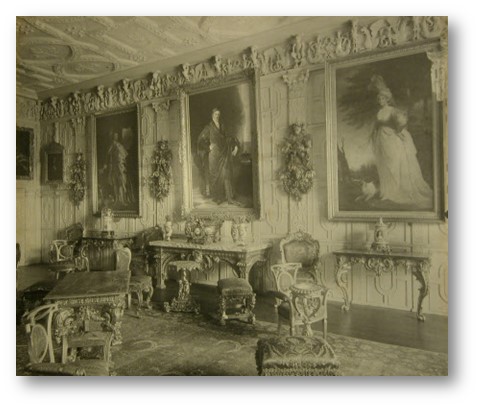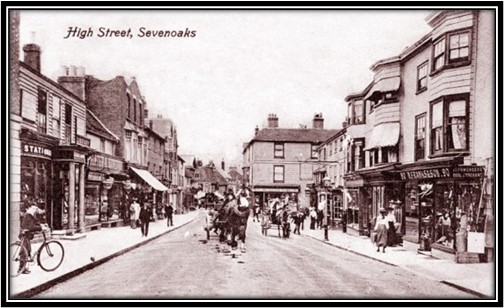Thursday September 14th 1898
Malcolm takes over writing Antonia’s diary for the next four days. I have transcribed his entries in green.

Here beginneth the first day of pleasure and leisure.
Rose at 7:30. Breakfast 8 0 clock.
Telegram from Gertrude at 9:00.
Off to London at 9:57.
Poor M.M.M. (Malcolm is feeling sorry for himself)
M.M.M. meets an Atkinson on the train. (Trinity College Cambridge but now a master at Rossall by Blackpool).
Arrives at Marylebone Police Court at 11:15.
Before Mr Denman
Reg & William Geary.
The prisoner was charged with molesting one Gertrude B. and assaulting Mr. E, a detective who arrested him on the previous night. G.B. and Mr. E gave evidence.
The prisoner said he wouldn’t do it again and the magistrate said he must find a surety of £10 to be of good behaviour for 12 months or go to prison for 6 weeks. [1]
M.M.M to Temple, leaving Cannon Street by 5-6 train.

Poor A.M.M. had to pack all by herself and wait until 5.0.
Then she drove to Chislehurst and met the train in which sat M.M.M. in a first class carriage.

Together we went to Sennocke (Sevenoaks) Royal Oak Hotel[2] and were met at the station by the proprietor J. Robinson (late Staff College), a Victoria[3] and cart and so arrived at the hotel. Dined and failed in 3 patiences[4]. So to bed.
This business of the hotel proprietor coming to meet new guests at the station is an interesting one.

“The town of Sevenoaks is a healthy, pleasant situation, remarkable for the many good houses throughout it, inhabited by persons of genteel fashion and fortune, which make it a most desirable neighbourhood”.
Edward Hasted, “History and Topographical Survey of the County of Kent”, 1797.
So Malcolm and Antonia played patience on holiday and so has every generation of the family since. Napoleon played patience too apparently, “to while away the weary hours on St. Helena,” the island of his exile.

The second day (still Malcolm writing the diary).
Rose consecutively from 8 to 9.
M.M went out to sniff the morning air and buy a newspaper before breakfast.

The Sevenoaks Chronicle and Kentish Advertiser was full of the Dreyfuss affair that day.
It was a lovely day.
We broke fast (eggs and bacon)
and did our duty writing letters. Then we went at 11:00 o’clock to Knole house. We knocked at the gates and a large footman. beautifully dressed let us in. We paid 4 bob manfully and entered the court and so into the house. M.M.M. was much impressed with the interior of the mansion.
This charmingly relaxed way of visiting stately homes was still common. It shows a delightful trust on the part of the owners.
The touring of country houses was popular throughout the nineteenth century and is sometimes fictionalised. In Pride and Prejudice when Elizabeth Bennet visits Pemberley House with her uncle and aunt, these were her impressions:
From every window there were beauties to be seen. The rooms were lofty and handsome, and their furniture suitable to the fortune of their proprietor; but Elizabeth saw with admiration of his taste, that it was neither gaudy nor uselessly fine; with less of splendour, and more real elegance, than the furniture of Rosings (Jane Austen, Pride and Prejudice).
The Austen family had strong links to Sevenoaks. Jane Austen visited Sevenoaks with her mother and father, and her sister Cassandra staying with her great uncle Francis at the Red House. Her cousin Thomas Austen inherited Kippington house in Sevenoaks in 1817. During the dispute between George the 4th and his wife Caroline in 1821 Thomas supported the king and refused to take part in the Pro Caroline celebrations in Sevenoaks. The mob supporting the queen attacked Kippington and broke the windows.


After lunch A reposed while M worked hard. Moderate tea in our apartments after which we walked through the town and bought photographs, scientific hatpins, envelopes of enormous size, veils, needles and retired to the hotel.

After dinner we played three Demon Patiences and failed in all and were very desperate. After our shopping good M. walked to the Bellevue Hill and nearly lost himself altogether.
The third day (still Malcolm writing).
Rose earlier. And breakfast. Unsatisfying fish[5] and after letters, etc. Good[6] A and M. went into Knole Park and carefully walked along the paths and sheltered under trees because it began to rain and they hadn’t got no umbrellas[7]. They did at last get safely home in between showers. In the afternoon at 3:00 PM, they set forth in a Victoria for Malcolm’s first drive. M. was very silent and awestruck. They saw the beauties of the neighbourhood in a succession of storms and admired the home of the Ladies Pratt[8]. The route taken was round Knole. To Bitchet Common towards Stone Street thence towards Seal, through wilderness to Godden Green and home through Sevenoaks. A large tea with jam followed and then M. walked for several miles and caught a sore throat, which he didn’t however mention on his return. Off to dinner again. Reading Anna Karenina in French and successfully foiled the demon cards.
Tolstoy used a lot of French in Anna Karenina anyway. ‘French was the language of the Russian Court. ‘The best philosophical and political discussions were held in French. Russian aristocrats also spoke in French when they wanted to say something but didn’t want their servants to know what they were saying. As in French, there is a formal and less formal means for expressing ‘you’ in Russian; however, in Russian it seems that the distinction is more extreme – that is, the formal is coldly formal, and the relaxed version is very familiar. In the novel, Tolstoy has Vronsky speaking to Anna in French, where he can use the polite but still personal vous form for a while, until their relationship develops into something more intimate.
It seems, however, that there were those who disapproved of this assimilation of the French language and felt that it detracted from their ‘Russian-ness’. Tolstoy has Levin embody this point of view in the novel. Levin, when observing Dolly, his sister-in-law, trying to get her young daughter to speak in French, thinks:
“And what does she talk French with the children for? … how unnatural and false it is! And the children feel it so: Learning French and unlearning sincerity …”’[9]

Malcolm and Antonia’s route that day was around 37 miles long.
[1] This seems a very minor punishment for molestation and common assault but these lenient sentences for men who molested women were not uncommon at the time particularly if the woman was not felt to be virtuous. In 1873 Elizabeth Garrett’s sister Millicent Fawcett had published an essay on this issue in which she quoted an article in the Times from April 1872: “Every day the reports of our police courts and of our criminal tribunals still repeat the tale of savage and cowardly outrages upon women: and every day we have reason to marvel, not without a mixture of indignation, at the leniency with which some of our judges treat offences of this kind.” The article had concluded, with deep disapproval, that an Englishman, “within certain limits, may beat his wife as much as he pleases”. Fawcett quoted the same newspaper, four months later, observing that “recent trials have revealed a prevalent indifference to the maltreatment of women, which is a heinous disgrace to English nature”.

Millicent Garrett Fawcett was born in Aldeburgh, in Suffolk, on 11 June 1847. Her father was a wealthy merchant and shipowner, and both her parents were remarkably free of the dominant ideology of male supremacy. Several of Millicent’s sisters were influential in the struggle for female equality. Her sister Elizabeth was to become one of the first female doctors in Britain (as Elizabeth Garrett Anderson), and her younger sisters followed her struggle against a male-dominated medical elite with interest and passion. Her sister Agnes became one of the first women interior designers in Britain, and also a pioneering businesswoman. Millicent Fawcett. She campaigned in favour of the enactment of the Married Women’s Property Bill and in favour of the repeal of the Contagious Diseases Acts. The former, in 1882, allowed married women some control over their own finances. The need for this was brought home viscerally to Millicent in 1877 when her purse was stolen at Waterloo Station. The thief was apprehended and charged with ‘stealing from the person of Millicent Fawcett a purse containing £1 18s 6d, the property of Henry Fawcett’. (‘I felt as if I had been charged with theft myself’, she later recalled.) The latter, in 1886, removed the right of police to arrest, detain and medically treat women suspected of being prostitutes, a poer which did not, of course, extend to their male clients – an egregious example of the sexual double standard. https://www.historytoday.com/archive/millicent-garrett-fawcett https://www.newstatesman.com/2013/10/founding-mothers
[2] The hotel has a rich history with Queen Victoria once staying here when she visited Knole House (National Trust), which is opposite the hotel.
[3] A Victoria is an elegant carriage style of French origin, possibly based on a phaeton made for George IV. A Victoria may be visualised as essentially a phaeton or brougham with the addition of a coachman’s box-seat, but not enclosed and therefore open to the elements. wikipedia
[4]The game of Patience originated in the U.K. around the same time as Solitaire, or slightly afterward. The OED has the earliest mention in 1801. It’s borrowed French: “I should be obliged to fetch the cards for you to play ‘Grande Patience'” — giving some credence to the theory that the game originated in France. It is also mentioned in a letter from a Countess Granville in 1822 (“We were occupied all yesterday evening with conjuring tricks and patiences of every kind”). In his novel Great Expectations of 1861 Dickens represents Magwitch as playing “a complicated kind of Patience with a ragged pack of cards”. Game expert David Parlett says the game, originally called Racing Demon, was created in the 1890s.
[5] Steamed Finnan Haddie (Haddock) was a favourite breakfast fish in 1899, brought south on the mail train from Aberdeen.
[6] A slight echo of Chaucer’s use of the word good and goodly here.
[7] A favourite joke of the English upper classes at the time was to mimic lower class use of grammar.
[8]The Pratt family (including Earls of Camden) owned a number of significant houses in Sevenoaks. In 1786, on the death of his mother in law, Frances Jeffreys, Charles Pratt acquired a great deal of land in Kentish Town, 300 acres of which he leased out for building 1,400 houses. The new development was named Camden Town in his honour.

[9] https://www.myfrenchlife.org/2012/04/26/anna-karenina-french-in-the-late-19th-century-russian-court/